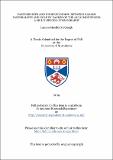Files in this item
Partnerships and understanding between Kazakh pastoralists and golden eagles of the Altai mountains : a multi-species ethnography
Item metadata
| dc.contributor.advisor | Bunn, Stephanie | |
| dc.contributor.author | McGough, Lauren Mueller | |
| dc.coverage.spatial | 234 p. | en_US |
| dc.date.accessioned | 2019-11-20T11:18:21Z | |
| dc.date.available | 2019-11-20T11:18:21Z | |
| dc.date.issued | 2019-12-04 | |
| dc.identifier.uri | https://hdl.handle.net/10023/18955 | |
| dc.description.abstract | This thesis is a study of the Kazakh tradition of hunting in partnership with golden eagles in the Altai Mountains of Mongolia. It represents a unique relationship among the spectrum of human-animal interactions – here eagles live both fully independent lives in the ‘wild’ and yet, for a time, are brought into the domestic sphere by Kazakhs and behave, in many ways, as a domesticated animal would. Kazakhs are able to accomplish this through the deep ethno-ornithological knowledge of the lives of eagles and a willingness to see eagles as beings with agency and engage in an intersubjective relationship with them. Kazakh pastoralists rely entirely on animals for their livelihood, and therefore communicate with goats, sheep, horses, camels, yaks and eagles on a daily basis. None of these relationships are of dominance, but rather co-domesticity. The aim of this thesis is to use the lens of cultivating a relationship with an eagle to better examine how human-animal interactions make us who we are, and help us understand the world around us. There are strong parallels in the lives of the eagles and Kazakhs of the Altai Mountains – both migrate with the seasons and utilize landscapes in similar ways. Along with notions of ‘domestic’ and ‘wild’, apprenticeship is a strong theme in this thesis. A Kazakh hunter must apprentice himself to both his eagle and his human mentor. In turn, the eagle becomes an apprentice of sorts as it learns to communicate with humans. Layers of interspecies communication saturate the landscape and challenge the notion of human exceptionalism. When we think about animals this way, like the Kazakhs do, truly special human-animal partnerships can occur. | en_US |
| dc.language.iso | en | en_US |
| dc.publisher | University of St Andrews | |
| dc.subject | Kazakh | en_US |
| dc.subject | Golden eagle | en_US |
| dc.subject | Human-animal relationship | en_US |
| dc.subject | Mongolia | en_US |
| dc.subject | Altai mountains | en_US |
| dc.subject | Ethno-ornithology | en_US |
| dc.subject | Traditional hunting | en_US |
| dc.subject | Nomadism | en_US |
| dc.subject | Pastoralism | en_US |
| dc.subject | Berkutchi | en_US |
| dc.subject | Falconry | en_US |
| dc.subject | Intersubjectivity | en_US |
| dc.subject | Domestication | en_US |
| dc.subject | Wild | en_US |
| dc.subject | Apprenticeship | en_US |
| dc.subject | Multi-species ethnography | en_US |
| dc.subject | Aquila chrysaetos | en_US |
| dc.subject.lcc | QL85.M3 | |
| dc.subject.lcsh | Human-animal relationships--Mongolia | en |
| dc.subject.lcsh | Kazakhs--Mongolia--Social life and customs | en |
| dc.subject.lcsh | Hunters--Mongolia--Social life and customs | en |
| dc.subject.lcsh | Golden eagle--Mongolia | en |
| dc.subject.lcsh | Ethnology--Mongolia | en |
| dc.subject.lcsh | Altai mountains--Social life and customs | en |
| dc.title | Partnerships and understanding between Kazakh pastoralists and golden eagles of the Altai mountains : a multi-species ethnography | en_US |
| dc.type | Thesis | en_US |
| dc.contributor.sponsor | University of St Andrews. Department of Social Anthropology Departmental Fee-waiver Scholarship | en_US |
| dc.contributor.sponsor | Explorers Club Graduate Student Grant 2012. | en_US |
| dc.type.qualificationlevel | Doctoral | en_US |
| dc.type.qualificationname | PhD Doctor of Philosophy | en_US |
| dc.publisher.institution | The University of St Andrews | en_US |
| dc.identifier.doi | https://doi.org/10.17630/10023-18955 |
This item appears in the following Collection(s)
Items in the St Andrews Research Repository are protected by copyright, with all rights reserved, unless otherwise indicated.

